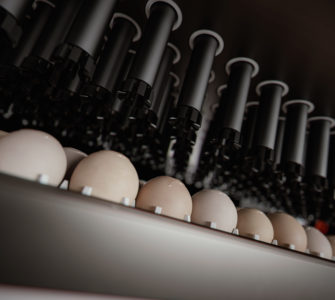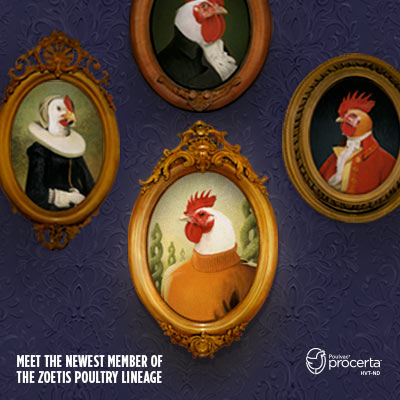State-of-the-art recombinant Poulvac® Procerta™ HVT-ND protects against Newcastle and Marek’s diseases
An interview with Abigail Reith, DVM, MAM, DACPV, Technical Services Veterinarian, Zoetis
Q: Zoetis recently introduced Poulvac® Procerta™ HVT-ND, a vectored recombinant vaccine to protect broilers against Newcastle and Marek’s diseases. What are the advantages of a vectored herpesvirus of turkey (HVT) vaccine?
AR: Vectored recombinant HVT vaccines provide flexibility because they can be administered in ovo as well as by subcutaneous injection. They also produce long-term immunity.1 This is the case with Poulvac Procerta HVT-ND, which was developed using advanced molecular technology. The vaccine provides foundational immunity against Newcastle disease2 (ND) to help prevent clinical disease and the high mortality that can occur from ND.
Q: Is it true that vectored recombinant HVT vaccines do not cause reactions?
SM: That’s correct and it’s another important advantage. Broilers need live vaccines for protection against other diseases — particularly infectious bronchitis (IB) — but live vaccines cause some reactions. These are normal and indicate the onset of immunity, but nevertheless they cause some short-term stress that can compromise performance. By using the recombinant instead of a live vaccine when broilers also need ND protection, there are fewer reactions, which in turn means less stress on birds.
Q: Maternal antibodies sometimes interfere with vaccination. Is this a concern with Poulvac Procerta HVT-ND?
AR: It shouldn’t be a concern. Antibodies initiated by Poulvac Procerta HVT-ND kick in about the same time maternal antibodies are waning. This was apparent in a study we conducted in commercial broilers,3 which can have high levels of maternal antibodies against the ND virus.
At 10 days of age, 100% of birds still had ND virus maternal antibodies. By day 17, that percentage fell to 40% in unvaccinated controls in comparison to 75% of Poulvac Procerta HVT-ND-vaccinated birds. This demonstrates active seroconversion while maternal antibodies are waning. In addition, ND virus antibodies induced by Poulvac Procerta HVT-ND were still rising on day 32 of age, which was the end of the vaccination period and prior to an ND virus challenge (Table 1).
Q: Does the onset of immunity vary depending on how the new vaccine is administered?
AR: No. The onset of immunity is fast-acting, and broilers are fully protected by 19 days of age whether the vaccine is administered in ovo or by subcutaneous injection on day of hatch.4
Poulvac Procerta HVT-ND delivers effective protection with a competitive onset of immunity against Marek’s disease and ND, showing 93% protection at 19 days of age in a study.5
The antibody response to the vaccine, however, starts as early as day 10 of age based on ELISA results in our study with commercial broilers.6
Q: Many poultry companies use the Zoetis live vaccine Poulvac Bursaplex® in ovo or by subcutaneous injection to protect broilers against infectious bursal disease (IBD). Can Poulvac Procerta HVT-ND be administered with that vaccine?
AR: We demonstrated in a controlled study that it can. Investigators gave broilers both vaccines, either in ovo or by subcutaneous injection on day of hatch, and then challenged the birds with a virulent strain of ND or with a virulent classic IBD virus. Based on parameters including efficacy, serology, mortality and clinical observation, they concluded the vaccines may be administered together without compromising their effectiveness.7
Q: Recombinant vaccines offer advantages over live vaccines containing the same antigens, but they cost more per dose. Can Poulvac Procerta HVT-ND be rotated in and out of a respiratory-disease program as a poultry farm’s needs and priorities change throughout the year?
AR: It certainly can. Vaccination programs need to vary according to local challenges and with the changing seasons, but generally speaking, respiratory problems tend to heighten in winter months. For many producers, it would make sense to use the more expensive recombinant vaccine in winter, especially if the live IB vaccination program needs to be intensified, and then switch to a live ND vaccine during summer. We’ve found that broilers tolerate live ND vaccines well during warm months.
When broilers also need protection against IBD, one option would be rotating from an HVT-ND vectored recombinant vaccine to an HVT-IBD vaccine during warm months — again to take stress off birds that are receiving live vaccines for IB. Remember that to get optimal results with HVT vaccines, only one can be used at a time. If antigens are delivered by two different recombinant vaccines, one will outcompete the other.8
1 Dimitrov K, et al. Newcastle disease vaccines — A solved problem or a continuing challenge? Vet Microbiol. 2017;206:126-136.
2 Luo Y, et al. Construction and efficacy of a recombinant HVT-ND vaccine against NDV and MDV challenges in SPF and NDV challenge in broiler birds. Am Assoc Avian Pathol. 2019.
3 Ibid.
4 Data on file. Study No. B814R-US-18-A53 Zoetis LLC.
5 Data on file. Study No. B815R-US-18-A46 Zoetis LLC.
6 Data on file. Study No. B810W-US-16-700 Zoetis LLC.
7 Turner-Alston K, et al. Compatibility of a Recombinant HVT-ND Vaccine with Bursaplex to Provide Protection against Velogenic NDV and Virulent Classic IBDV Challenge in SPF Birds. Am Assoc Avian Pathol. 2019.
8 Dimitrov K, et al. Newcastle disease vaccines — A solved problem or a continuing challenge?
TOOLBOX, Issue 19
Toolbox is a series of interviews with veterinarians and other technical specialists about their experiences managing antimicrobials, vaccines and other tools for poultry health. It is produced by the editors of Poultry Health Today on behalf of the US Poultry Business of Zoetis.
BIO-00222
May 2020
Posted on August 24, 2020















